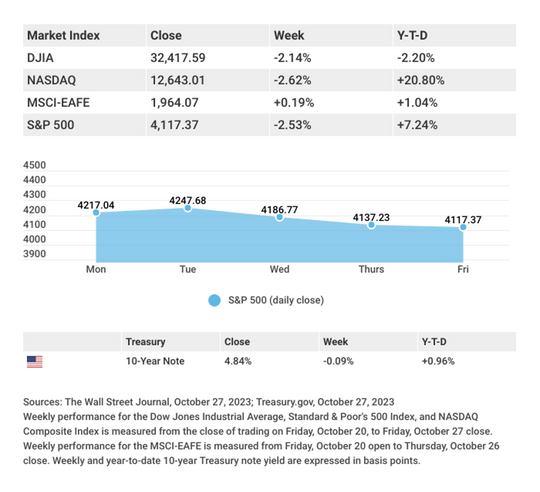Amid a busy week of corporate earnings reports, stocks slumped on cautious earnings guidance, fears of higher interest rates, and growing anxiety over the increasing amount of Treasury bonds and notes coming to market.
The Dow Jones Industrial Average dropped 2.14%, while the Standard & Poor’s 500 declined 2.53%. But the Nasdaq Composite index gave up 2.62% for the five trading days. The MSCI EAFE index, which tracks developed overseas stock markets, added 0.19%.1,2,3

October Slide Continues
Stocks continued their slide last week despite mostly better-than-expected earnings results. While earnings surprises were generally positive, investors were troubled by declines in year-over-year net profit margins and tepid earnings guidance. Particularly hard hit were technology companies, following mixed earnings results.
Economic data released on Thursday showed remarkable economic strength, with above-consensus forecast growth in third-quarter Gross Domestic Product (GDP) and September’s durable goods orders, with only a minor uptick in initial jobless claims. The results fanned worries that the Fed might need to hike rates further or, at least, maintain high rates for longer.
Strong Economic Data
The first read of third-quarter economic growth was a blowout, with GDP increasing at an annualized rate of 4.9%. This pace was well ahead of the prior quarter’s 2.1% expansion and above consensus forecasts. Powering the third quarter’s economic performance was strong consumer spending and inventory build-up.4
Durable goods orders jumped 4.7% in September, confirming the nation’s continued good economic health, easily outpacing the 0.1% rise in August and economists’ forecast of two percent. Meanwhile, initial jobless claims slightly increased, suggesting that the labor market remains healthy.5
This Week: Key Economic Data
Wednesday: FOMC Announcement. Automated Data Processing (ADP) Employment Report. Institute for Supply Managers’ (ISM) Manufacturing Index. Job Openings and Turnover Survey (JOLTS).
Thursday: Factory Orders. Jobless Claims.
Friday: Employment Situation. Institute for Supply Managers’ (ISM) Services Index.
Source: Econoday, October 27, 2023
The Econoday economic calendar lists upcoming U.S. economic data releases (including key economic indicators), Federal Reserve policy meetings, and speaking engagements of Federal Reserve officials. The content is developed from sources believed to be providing accurate information. The forecasts or forward-looking statements are based on assumptions and may not materialize. The forecasts also are subject to revision.
This Week: Companies Reporting Earnings
Monday: McDonald’s Corporation (MCD), Arista Networks, Inc. (ANET)
Tuesday: Pfizer, Inc. (PFE), Caterpillar, Inc. (CAT), Amgen, Inc. (AMGN), Marathon Petroleum Corporation (MPC)
Wednesday: Advanced Micro Devices, Inc. (AMD), CVS Health Corporation (CVS), Qualcomm, Inc. (QCOM), PayPal Holdings, Inc. (PYPL), Humana, Inc. (HUM)
Thursday: Apple, Inc. (AAPL), Starbucks Corporation (SBUX), Shopify, Inc. (SHOP), Eli Lilly and Company, Inc. (LLY), Duke Energy Corporation (DUK), Cigna Group (CI), ConocoPhillips (COP)
Friday: Berkshire Hathaway, Inc. (BRK.A)
Source: Zacks, October 27, 2023
Companies mentioned are for informational purposes only. It should not be considered a solicitation for the purchase or sale of the securities. Investing involves risks, and investment decisions should be based on your own goals, time horizon, and tolerance for risk. The return and principal value of investments will fluctuate as market conditions change. When sold, investments may be worth more or less than their original cost. Companies may reschedule when they report earnings without notice.
Footnotes and Source
1. The Wall Street Journal, October 27, 2023
2. The Wall Street Journal, October 27, 2023
3. The Wall Street Journal, October 27, 2023
4. CNBC, October 26, 2023
5. CNBC, October 26, 2023
6. IRS.gov, January 19, 2022
7. Cleveland Clinic, July 19, 2023
Investing involves risks, and investment decisions should be based on your own goals, time horizon, and tolerance for risk. The return and principal value of investments will fluctuate as market conditions change. When sold, investments may be worth more or less than their original cost.
The forecasts or forward-looking statements are based on assumptions, may not materialize, and are subject to revision without notice.
The market indexes discussed are unmanaged, and generally, considered representative of their respective markets. Index performance is not indicative of the past performance of a particular investment. Indexes do not incur management fees, costs, and expenses. Individuals cannot directly invest in unmanaged indexes. Past performance does not guarantee future results.
The Dow Jones Industrial Average is an unmanaged index that is generally considered representative of large-capitalization companies on the U.S. stock market. Nasdaq Composite is an index of the common stocks and similar securities listed on the NASDAQ stock market and is considered a broad indicator of the performance of technology and growth companies. The MSCI EAFE Index was created by Morgan Stanley Capital International (MSCI) and serves as a benchmark of the performance of major international equity markets, as represented by 21 major MSCI indexes from Europe, Australia, and Southeast Asia. The S&P 500 Composite Index is an unmanaged group of securities that are considered to be representative of the stock market in general.
U.S. Treasury Notes are guaranteed by the federal government as to the timely payment of principal and interest. However, if you sell a Treasury Note prior to maturity, it may be worth more or less than the original price paid. Fixed income investments are subject to various risks including changes in interest rates, credit quality, inflation risk, market valuations, prepayments, corporate events, tax ramifications and other factors.
International investments carry additional risks, which include differences in financial reporting standards, currency exchange rates, political risks unique to a specific country, foreign taxes and regulations, and the potential for illiquid markets. These factors may result in greater share price volatility.
Please consult your financial professional for additional information.
This content is developed from sources believed to be providing accurate information. The information in this material is not intended as tax or legal advice. Please consult legal or tax professionals for specific information regarding your individual situation. This material was developed and produced by FMG Suite to provide information on a topic that may be of interest. FMG is not affiliated with the named representative, financial professional, Registered Investment Advisor, Broker-Dealer, nor state- or SEC-registered investment advisory firm. The opinions expressed and material provided are for general information, and they should not be considered a solicitation for the purchase or sale of any security.
Copyright 2023 FMG Suite.


